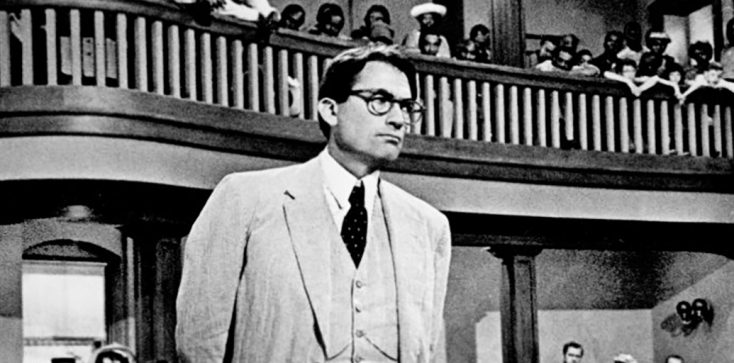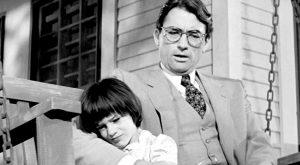By JUDY SLOANE
Special to Front Row Features
This is one of several vintage interviews with beloved Hollywood celebrities reflecting on their most famous films. All of the interviews were conducted by veteran Hollywood correspondent Judy Sloane, who is now a regular contributor to Frontrowfeatures.com. We hope you enjoy taking a walk down memory lane with Judy and the various celebrities (most of whom have long since passed) talking frankly and openly about the films that made them famous. This installment is an interview with Academy Award winner Gregory Peck, who starred in the big screen adaptation of Harper Lee’s Pulitzer Prize-winning novel “To Kill a Mockingbird.”
HOLLYWOOD—In July, 1960, the novel “To Kill a Mockingbird,” written by first-time author Harper Lee, took America by storm. It subsequently was adapted into a motion picture, and premiered on March 16, 1963, after a limited release in December 1962 for awards consideration.
Gregory Peck starred as small town widower lawyer Atticus Finch, and spotlighted his relationship with his two children, Scout (Mary Badham) and Jem (Phillip Alford), and the racial injustice that plagued the deep South during the Depression. When a young black farm worker named Tom Robinson (Brock Peters) is accused by a white girl of raping her, Atticus agrees to defend him, with devastating consequences.
I interviewed Gregory Peck in 1994, just days after a 6.8 earthquake rocked Los Angeles. He was as cordial and lovely as you would expect him to be, showing me all the earthquake damage in his Beverly Hills home. He also introduced me to his two dogs, who he says leapt onto his face, terrified during the intense shaker. Peck died on June 12, 2003 at age 87.
“To Kill a Mockingbird,” directed by Robert Mulligan and adapted for the screen by Horton Foote, was one of the actor’s favorite movies as you can tell by this interview.
Judy Sloane: How did you become involved with the film?
Gregory Peck: It was (director) Bob Mulligan and (producer) Alan Pakula who called me one day and said they had acquired the rights to a wonderful book, and they thought I’d be right for the father, who was a small town lawyer.
At the time, I had an independent production company at Universal, so I was able to be instrumental in getting them the financing. I had some standing, so (Universal) got a sure thing. All they had to do to get it was give up all the autonomy over the picture and give Bob and Alan the final cut … and they did.
Sloane: Why was the movie shot in black and white?
Peck: They thought it might be prettified by color, and it would get in the way of the emotions, tension and the human element that was so important. It was an intuition that they had and, since they’d gotten complete control over their movie, they decided to do it. I was all for it.
Sloane: In the early Sixties, racial conflict films were not the surest recipe for box office success. Did that worry you?
Peck: Not at all. Yes, it had to do with racial prejudice, but it never occurred to any of us to worry about that. It was a Pulitzer Prize winner, and people were lining up at bookstores. We thought we had a winner. All we had to do was do it right.
Sloane: Your character, Atticus Finch, was based on Harper Lee’s father, Amasa. Did you ever get to meet him?
Peck: Yes. He was always smiling at Harper, because he was thinking of the tomboy that lived in the tree house and rolled down the dusty street curled up in a tire. That was Harper. She was Scout. And, in that sense, the (novel) was autobiographical. She’d won the Pulitzer Prize (for it). He was proud of her.
After he died, but before the picture came out, Harper gave me his watch, which meant a lot to me. It was not the one I used in the courtroom scene that was a prop. But I had watched him, and he always wore a three-piece-suit and he had a watch chain. He had a habit of handling it, looking at it and putting it back. I used that in the courtroom.
Unfortunately, the watch was stolen from us some years later at Heathrow Airport. I was depressed about it. When I told Harper, “I lost that precious watch your father carried in the courtroom for 40 years,” she said, “It’s only a watch!” She was detached and philosophical about it. But I still regret it.
Sloane: Did Harper Lee ever come on the set to watch filming?
Peck: Harper came the first day of shooting. The scene was when I’m coming home at the end of the day and the kids run down the street to the corner.
Then we walk a block and talk about what happened during the day.
While we were walking along and playing the scene, I caught a glimpse of Harper across the street and it registered on me that there were tears on her cheeks. (When we finished the scene,) I walked over to Harper. I was thinking, “Oh, we killed her, we just (filmed) something terrific.” She said, “Oh Gregory, you’ve got a little potbelly just like my daddy!” I said, “That’s the best compliment I’ve ever gotten.”
Sloane: What do you remember about working with Mary Badham and Phillip Alford?
Peck: They were intelligent, well-mannered and they were not self-conscious. I got along easily with the children from the beginning. We started rehearsing without any camera in sight—just play acting—going through the scenes. Bob started bringing a camera in their vicinity, and then moved it a little closer and ultimately stuck it in their faces and they paid no attention to it.
Sloane: What was your relationship like with Brock Peters?
Peck: Brock and I are close friends today. (Peters died in 2005.) I always teased him; I’d call him “cry baby,” because he couldn’t tell his story during the trial scene without tears running down his face. He truly felt the emotions of his character. I couldn’t look at him without choking up myself and I couldn’t go on. You can’t have two people crying in the scene. I found the answer to it; I (stopped looking) him in the eye.
We rehearsed the courtroom scene for two weeks before shooting it. I don’t know how many times we did it from different angles, I just enjoyed it. It was like getting back on the stage.
Sloane: You won the Academy Award for the movie. Did you expect that?
Peck: No. To tell you the truth, I thought Jack Lemmon would win for “Days and Wine and Roses.” As I walked down the aisle, Jack happened to be right there and I took three or four steps and just tapped him on the shoulder as I went by. In a lucky coincidence, Jack won the Oscar several years later for “Save the Tiger,” and I was up there presenting him with it.
Years later, at the American Cinema Awards, when they presented me with an award, I said, “I would like you to meet Bill Walker, who won the Oscar for me. He was the gentleman who (at the conclusion of the court case) said, “Stand up children, your father’s passing.” And I said, “Bill, will you please stand up?” He got a tremendous ovation, so that kind of rounded out the circle. I was happy that happened. He’s gone now.
Sloane: Why do you feel the movie has remained such a classic?
Peck: I’m glad it’s still alive. It seems to have a life, and it all goes back to Harper and the way she grew up with her father’s values. She was able to somehow transfer that into a book, and we were able to get it on the screen. It was meant to be. We all feel lucky that we were in it, and that it was recognized and that it still affects people. That doesn’t happen often.
Portions of this interview were first published in Film Review Magazine.






